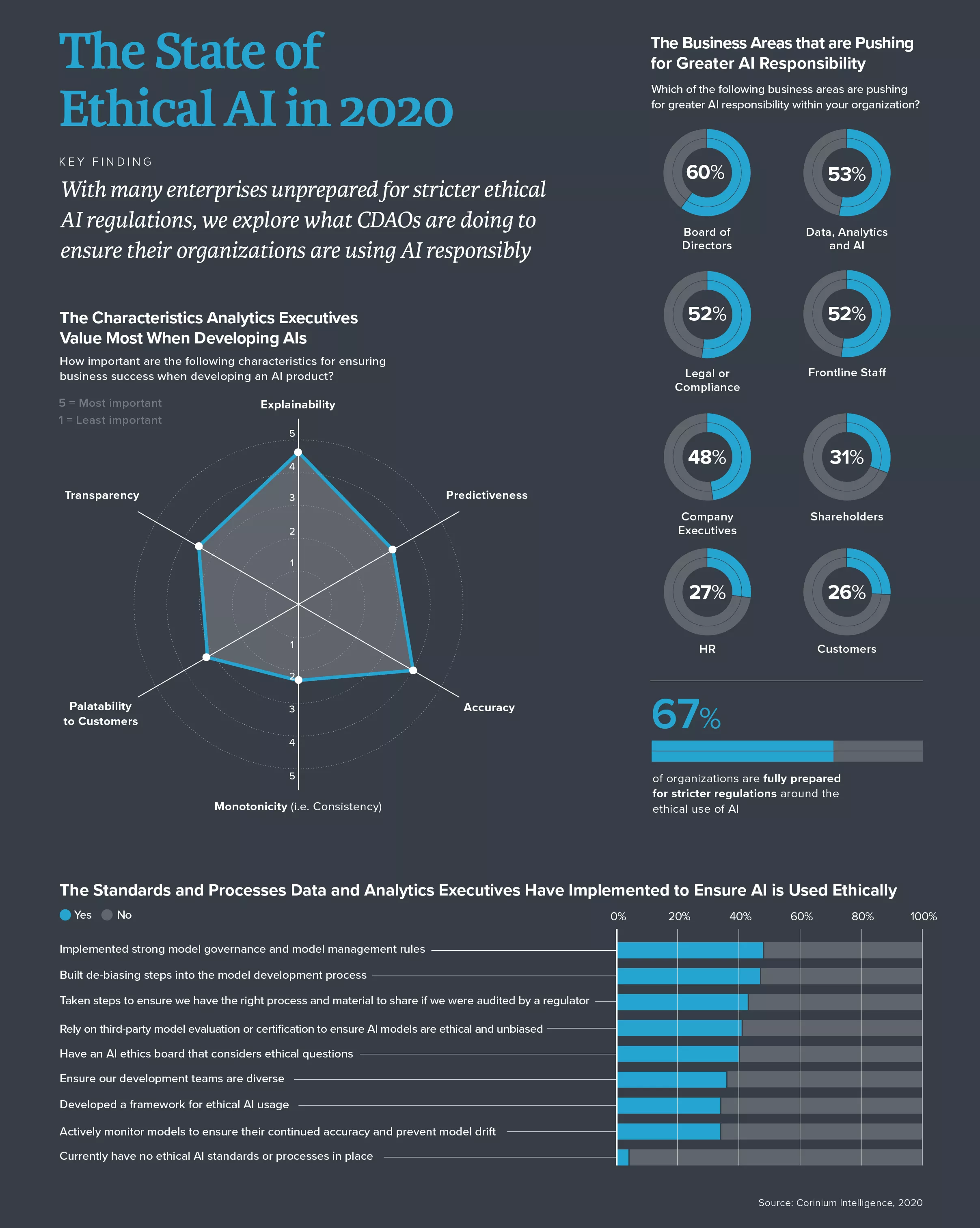5 Key Research Findings on Enterprise Artificial Intelligence
New research on artificial intelligence shows how CAOs and CDOs are responding to the current pandemic, economic uncertainty, and renewed focus on social justice

Hot off the press today is a FICO-commissioned research study on artificial intelligence and how Chief Analytics Officers (CAOs) and Chief Data Officers (CDOs) are responding to the current pandemic, economic uncertainty, and renewed focus on social justice. In additional to a survey, in-depth interviews with the top AI leaders at HSBC, AXA PPP, Banorte, and Chubb provides additional perspective and commentary.
The entire 24-page report is available for download; however I wanted to share some highlights from the research that I found to be particularly impactful, or perhaps even surprising given the amount of hype around AI in the market today.
1 – Many Organizations Are Not Yet Monitoring their Predictive Models for Drift
The pandemic has caused a drastic shift in consumer behavior as individuals stay at home and adjust their daily routines. Many travel, hospitality, and restaurant workers are out of work, and those fortunate to still be employed have shifted their spending patterns. This in turn has put pressure on AI and machine learning teams to ensure the accuracy of their predictive models in this changed environment, yet only 33% are monitoring their models in production.
2 – Responsible AI Has Never Been More Important
Explainable AI has been a priority for many. Explainable AI is a necessary but not sufficient condition of producing ethical AI models, and 93% of respondents report that ethical considerations must be addressed in order to drive additional AI adoption in their organization.
First, as the Black Lives Matter movement has forced many global organizations to re-examine their diversity and inclusion practices, the behavior of AI systems and predictive models are now being re-examined as well. Some key questions that must be answered include:
- Are my predictive models operating in a fair and inclusionary way?
- Has my data been property evaluated and corrected for potential data bias?
Without explainable AI (xAI) corporate standards and proper model governance and model audit trails, it’s very difficult or impossible to answer these questions confidently. As one solution to this problem, see FICO’s blockchain for an immutable model development audit log that makes answering these questions easy.
Second, as data patterns have shifted, how can organizations be sure their existing models are robust and will continue to meet their business needs? Predictive models rank-order the likelihood of outcomes, and the rank-ordering for a well-developed model is generally preserved even if the odds shift higher or lower in general. Rather than rebuilding the model during a drastically shifting non-stationary data pattern, a robust model can be wrapped with refreshed decisioning criteria or a new policy to continue to reach the desired results.
3 – Scorecards Are Dead! Long Live Scorecards!
The hype of AI can be exhausting. Some vendors would have you believe that techniques like AutoAI will eliminate the need for data scientists, and machine learning is superior to traditional statistical modeling approaches and scorecards in every way, shape and form.
In fact, the reality is that there is a spectrum of algorithms and approaches within machine learning and statistics, and the context of use and definition of the problem matter hugely for which algorithm or approach is most appropriate to each problem.
Perhaps not surprising, nearly 46% of global CAOs report that, despite the heavy daily doses of AI hype, the scorecard continues to show “potential for large impact” in their organization. It’s a proven, highly explainable approach for predictive analytics that continues to be appropriate for mission-critical and regulated use cases.
4 – The Race for AI Continues
A recent headline in Bloomberg read: Coronavirus Will Finally Give Artificial Intelligence Its Moment. Will the pandemic result in a kind of golden age for AI? Only time will tell, however we can say that the shift to digital has caused 57% of global organizations to report that COVID-19 has increased demand for AI products.
While the board of directors and C-suite almost universally appreciate the importance of AI (100% of respondents indicate is either or fully accepted as a strategic imperative), it does appear that there will be more pressure to show clear ROI and cut through the hype to provide a mature and sophisticated approach to AI.
With 65% reporting that building a team with the right skills is a medium or large barrier for success, it’s likely that teams will continue to invest in efficient processes, streamlined development to production environments, and centralized approaches to AI governance and skills and resource management. As I’ve indicated ‘its time for AI to grow up’ and meet with mature processes and governance that are appropriate to the impact these models have on our businesses and those that are served by these models.
5 – Adversarial AI Attacks Have Arrived
It’s common knowledge how easy it is to trick and subvert AI systems. Even changing a single pixel can cause an image recognition system to categorize an obvious truck as a giraffe, for example.
Organizations are waking up to the fact that these adversarial players are hard at work within their organizations. 12% of organizations have reported experiencing an adversarial AI attack and 24% report they have experienced data poisoning. These are likely happening more often than CAO/CDOs recognize and pose a serious threat to sustained long-term use of AI in the mainstream. As such, it is an area that warrants a close watch.
We hope you find the research useful as a source of industry benchmarking, and independent data source to evaluate your current investments and strategy with respect to AI, machine learning and advanced analytics.
There are many other interesting findings in the report, including how CAOs and CDOs track and report metrics for success, how global AI organizations are structured, how analytic leaders interface with their board of directors and C-suite counterparts, and how organizations are progressing in their evolution to be more mature data & analytics-focused organizations that use responsible AI to deliver compelling customer experiences, and support the business to compete and win.

Popular Posts

Business and IT Alignment is Critical to Your AI Success
These are the five pillars that can unite business and IT goals and convert artificial intelligence into measurable value — fast
Read more
Average U.S. FICO Score at 717 as More Consumers Face Financial Headwinds
Outlier or Start of a New Credit Score Trend?
Read more
Average U.S. FICO® Score at 716, Indicating Improvement in Consumer Credit Behaviors Despite Pandemic
The FICO Score is a broad-based, independent standard measure of credit risk
Read moreTake the next step
Connect with FICO for answers to all your product and solution questions. Interested in becoming a business partner? Contact us to learn more. We look forward to hearing from you.
